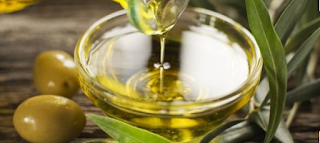olive oil
Olive oil is a food that has been in use for thousands of years, and is the only oil extracted from the fruit rather than the seeds or grains. Olive oil varies in its flavor and color depending on the degree of maturity of the olive fruits, the nature of the climate and the type of soil. High quality olive oil with a thick texture. It should be noted that this oil does not contain carbohydrates or protein, and therefore the source of most of the calories is the monounsaturated fatty acids (monounsaturated fatty acids) it contains, which are also classified as healthy fats, and you should pay attention to this. The fat in it increases its soaking (Rancid), so it is important to protect it from light and heat, and once the package is opened, it must be used within six months, preferably stored in a dark and cool place or in a cool place. Refrigerator; Storing it properly helps preserve its flavor and nutritional properties.
The effect of olive oil on obesity
Although olive oil is considered a healthy fat, moderation is the key to avoiding weight gain. One study published in August of 2016 found the effect of a high-fat Mediterranean diet on weight and belly fat in older adults, most of whom are overweight. Overweight and at risk of heart disease, and after about five years, it was noted that those who followed the Mediterranean diet with extra-virgin olive oil lost approximately 0.45 kilograms compared to another group who followed a diet rich in nuts with a low-fat diet. It was observed that the waist measurement decreased to about 0.93 centimeters compared to the placebo group. Another study indicated that there are potential benefits on weight when eating meals rich in monounsaturated fats such as olive oil; The study included 32 obese women, and it was found that the women who consumed between 15% and 20% of the total calories from olive oil had a slight decrease in weight, as well as a decrease in body mass index (BMI), waist circumference, and the percentage of fat in the body. The body, while the increase in weight is caused by excessive consumption of olive oil.
olive oil benefits
Olive oil offers a wide range of benefits for the health of the body, including the following:
It contains a high amount of antioxidants:
These are biologically active substances that may reduce the risk of chronic disease, fight inflammation, and help protect cholesterol from oxidation, which can reduce the risk of heart disease.
It has anti-inflammatory properties:
Chronic inflammation is considered a cause of many diseases, such as: cancer, heart disease, metabolic syndrome, type 2 diabetes, arthritis, and obesity, and it has been shown that extra virgin olive oil can reduce inflammation, and research indicates that oleic acid Oleic Acid, one of the main fatty acids in this oil, can reduce levels of inflammatory markers in the body.
Reduces the risk of stroke:
Occurs due to disruption of blood flow to the brain, either due to a blood clot or bleeding, and it was found in an analysis of several studies conducted on 841,000 people that olive oil was the only source of monounsaturated fats linked to a lower risk of stroke and heart disease.
Reduces the risk of Alzheimer's disease:
(Alzheimer's disease); As this disease is considered one of the most common neurodegenerative conditions in the world, it is represented by the accumulation of so-called beta-amyloid plaques inside brain cells, and it was shown in a study conducted on mice that olive oil can help remove these plaques.
Reduces the risk of breast cancer:
It has been shown that virgin olive oil may reduce the risk of cancerous tumors through several mechanisms, including stimulating the death of cancer cells, preventing damage to DNA, and others, while it has been found that there is a relationship between the consumption of virgin olive oil and the incidence of benign cancer in the breast.
Helps treat constipation:
It has been shown that taking olive oil orally is effective in reducing constipation.
Reduces the risk of developing type 2 diabetes:
Where some research has shown that monounsaturated fats in olive oil may contribute to reducing the risk of developing type 2 diabetes, as it was found to have a good effect on blood sugar level and insulin sensitivity, and another study showed that eating 15 to 20 milliliters of Olive oil daily is associated with a lower risk of diabetes.
Varieties of olive oil
When olive oil is extracted, it is subjected to many filtering and processing processes, and the quality increases the less it is exposed to these processes, and we mention the following varieties of olive oil:
Extra virgin olive oil:
Where this variety is considered the best among the other varieties, and a small amount of heat is used, without the use of any chemicals, and it is extracted by cold pressing, and it is produced from the first stage of pressing olives.
Extra virgin olive oil:
This oil is produced from the second stage, and a small amount of heat is used, and without any chemicals as well.
Pure olive oil:
This variety is considered non-virgin olive oil, and this type consists of inferior oils that result from repeated pressing processes that the fruits were exposed to after extracting the virgin oil, and this oil is subjected to a refining process that includes the use of heat, chemical solvents, and high pressure, then this oil is mixed in a small amount of virgin olive oil to restore color and flavour.
Light olive oil:
As this variety is considered the lowest quality among the other varieties, it contains little of the natural flavor and color of olives.

